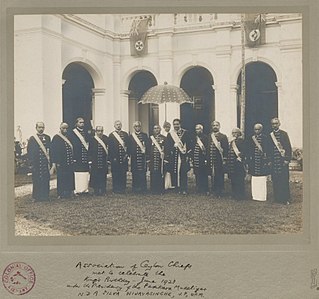
Junius Richard Jayewardene, commonly abbreviated in Sri Lanka as J.R., was a Sri Lankan lawyer, public official and statesman who served as Prime Minister of Sri Lanka from 1977 to 1978 and as the second President of Sri Lanka from 1978 to 1989. He was a leader of the nationalist movement in Ceylon who served in a variety of cabinet positions in the decades following independence. A longtime member of the United National Party, he led it to a landslide victory in the 1977 parliamentary elections and served as prime minister for half a year before becoming the country's first executive president under an amended constitution.

Mudaliyar was a Ceylonese colonial title during Portuguese and British rule of the island. Stemming from the native headman system, the title was usually hereditary, made to wealthy influential families loyal to the British Crown.
Fredrick Richard Senanayake was a Ceylonesen lawyer and independence activist. A leading member of the Sri Lankan independence movement, he was an elected member of the Colombo Municipal Council. F.R Senanayake, who would go on to lead Sri Lanka's independence movement, becoming a Barrister of independent Sri Lanka in 1947.

Don Richard Wijewardena was a Sri Lankan media proprietor who was involved in the Sri Lankan independence movement. A successful entrepreneur, he established Associated Newspapers of Ceylon Limited and played a significant role in the independence movement.

Richard Gotabhaya Senanayake was a Sri Lankan politician. He was Minister of Trade and Commerce during the period 1952-56 and 1956-60. He was elected a Member of Parliament from Dambadeniya in 1952 and in 1956 from Kelaniya, thus holding concurrent seats from two constituencies, while he retained his seat from Dambadeniya in 1960 and 1965. He was the eldest son of the freedom fighter Fredrick Richard Senanayake and was educated at the Royal College, Colombo and at Downing College, Cambridge and had become a barrister.
Justin Kotelawala, CBE, JP was a Sri Lankan businessman and senator. He was the former chairman of the Ceylinco Group.

Eugene Wilfred Jayewardene, KC was a Ceylonese judge, lawyer and politician. He was a Judge of the Supreme Court of Ceylon and is the father of J. R. Jayewardene the first executive President of Sri Lanka.
Colonel Theodore Godfrey Wijesinghe Jayewardene, VD, JP, CLI was a Ceylonese engineer, politician and military officer. A member of the State Council of Ceylon, he was the first Ceylonese commanding officer of the Ceylon Light Infantry.
John Adrian St. Valentine Wijesinghe Jayewardene (1877–1927) was a Ceylonese judge and lawyer. He was a Judge of the Supreme Court of Ceylon.

John Kotelawala was a Ceylonese police officer and businessmen. He was known for the murder of Francis Dixon Attygalle, one of the first sensational murder trials in Ceylon. His son General Sir John Kotelawala was the 3rd Prime Minister of Ceylon.
Major Theodore Frederick "Freddy" Jayewardene was a Ceylonese planter and politician. He was the Parliamentary Secretary to the Minister for Labour and Member of Parliament for Colombo South from 1948 to 1956.
Rolland "Rolly" P. Jayawardene, FRCP was a Sri Lankan Physician. He was the Director-General of the Natural Resources Energy and Science Authority.
Cyril Eugene Attygalle was a Ceylonese politician.

The Kandyan period covers the history of Sri Lanka from 1597–1815. After the fall of the Kingdom of Kotte, the Kandyan Kingdom was the last Independent monarchy of Sri Lanka. The Kingdom played a major role throughout the history of Sri Lanka. It was founded in 1476. The kingdom located in the central part of Sri Lanka managed to remain independent from both the Portuguese and Dutch rule who controlled coastal parts of Sri Lanka; however, it was colonised by the British in 1815.
The Wijewardene family is a Sri Lankan family that is prominent in enterprise and politics. Along with many members who have been successful politicians across generations, the family includes two Chief Justices, two Prime Ministers and two Presidents of Sri Lanka.

The Senanayake family is a Sri Lankan family that is prominent in enterprise and politics. Along with many members who have been successful politician across generations, the family includes two Prime Ministers of Sri Lanka.
Mudaliyar Don Charles Gemoris Attygalle was a Ceylonese entrepreneur and mine owner. He was a successful graphite mine owner and was given the titular title of Mudaliyar for social service by the British Governor of Ceylon. Through the marriage of his daughters, the Senanayake family and the Jayewardene family were connected and played a major part in the Sri Lankan independence movement and in post-independence politics, due in part to the wealth he had accumulated.
The murder of Francis Dixon Attygalle took place on 5 December 1906, after he was shot in the abdomen and later succumbed to his injuries in hospital. The murder became Ceylon's first sensational trial, which lay blame on Attygalle's brother-in-law John Kotelawala Sr, who committed suicide in jail before the verdict was given.
Alice Elisabeth Kotelawala, CBE was a Ceylonese businesswoman and philanthropist. She was the mother of Sir John Kotelawala, third Prime Minister of Ceylon.








